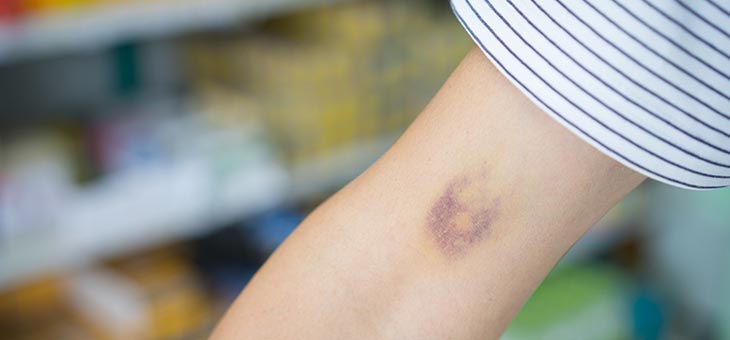Some people bruise like a peach and can find themselves with blemishes after just brushing past a table, others can come out of a pretty nasty fall with no marks at all.
But what about the science behind this?
Dr Clare Morrison says: “It’s quite common for patients to complain of bruising easily, particularly women, and older people, and it doesn’t necessarily mean that there is anything wrong.”
So why do some people bruise more easily than others? Here are some explanations.
Medication

First things first: what are bruises? They’re the result of the blood vessels under the skin breaking or bursting. The blood leaks into the soft tissue of your skin, which is where the angry red colour comes from. Luckily, it fades to yellow and green colours over time.
Dr Morrison says: “It’s often caused by medications, such as blood thinners, aspirin, steroids, or anti-inflammatories, such as ibuprofen.”
Blood thinners and anti-inflammatories affect how your platelets work – a part of the blood that helps it clot and stop flowing. Therefore, if your blood capillaries burst it might take a bit longer for the internal bleeding to stop, resulting in a bigger looking bruise.
Read: Is that medication right for you?
Lifestyle
Your lifestyle can also affect how easily you bruise. Dr Morrison says: “It can be seen after intense exercise, with heavy drinking, or with sun damage (particularly on the backs of hands).”
Let’s break this down – why would these seemingly unrelated factors contribute to bruising? Well, hardcore exercise can weaken your muscles and blood vessels, making it easier for them to burst. It also doesn’t help that if you’re running or cycling you’re more likely to accidentally bash your legs against some equipment.
If you’ve damaged your liver through heavy drinking, there are likely to be fewer platelets in your blood – which has the same effect on bruising as if you were taking blood thinners. And finally, sun damage can weaken blood vessel walls, making it more likely for them to burst.
Vitamins
Dr Morrison explains: “A lack of certain vitamins can cause easy bruising, notably vitamins C, K, and B12; and also folic acid.”
Vitamins such as vitamin K help the blood coagulate, so it makes sense that it would affect bruising. Luckily, these things are easily fixed. “It’s worth checking your diet, or taking a multivitamin,” Dr Morrison says.
Read: Five vitamins from real food
Medical issues
However, there are also some deeper underlying medical issues that can make you more susceptible to bruising. Dr Morrison says: “Some inherited clotting disorders such as haemophilia or Von Willebrand’s [disease] can also cause easy bruising from a young age. These people will probably also have problems with excessive bleeding, and may have affected relatives.”
Bruising is often linked to the amount of platelets in your blood. The condition of not having enough is called thrombocytopenia, and Dr Morrison says: “This can happen temporarily after a viral illness, with certain medications or during pregnancy. Sometimes it’s more serious and needs medical treatment.”
She also says that some types of cancer (such as leukaemia, which affects your blood) can also contribute. Dr Morrison adds: “Rare medical conditions such as Cushings syndrome can cause easy bruising. This is due to too much cortisol (natural steroid) in the body.”
Age

Older people tend to bruise more easily than their younger counterparts. The science behind this is pretty simple – as you get older, your skin and the blood vessels underneath become increasingly fragile and burst more easily.
Read: These seven tips are vital for healthy ageing
Dr Morrison says: “If in doubt, see your GP for a check-up. They can examine you and arrange for blood tests, if necessary, to rule out anything serious.”
Do you bruise easily? Do you know the underlying cause behind it? Let us know in the comments section below.
– With PA


Many people don’t know that over-the-counter fish oil is also a mild blood thinner. Therefore, it must be mentioned, & possibly stopped, if undergoing a medical procedure or an operation, as it can inhibit blood-clotting.